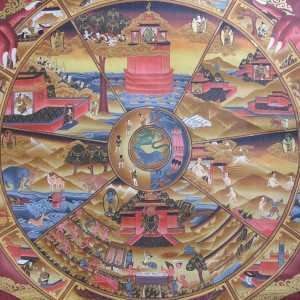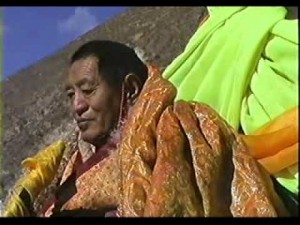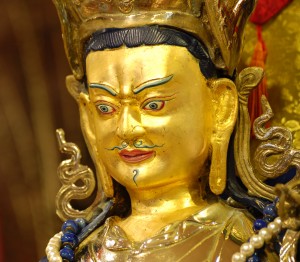
The following is an excerpt from a teaching by Jetsunma Ahkon Lhamo called “Western Chod”
I came to understand that that is the way it would be. I had to not lie to sentient beings. I could not hold these beings in my arms and say, “Here I am for you. I’ll do anything I can for you,” because it was complete, pardon my French, bullshit. You know, I was lying to them. So I began to think, “Well, if this unlimited luminous, pure, uncontrived nature that is free of suffering could somehow be here, that’s it. That’s it.” But how to do it? How to do it?
At that time I really didn’t have the answers. Honestly, I have to tell you that part of my life was like mountain tops and valleys at the same time, because I really felt the bliss of feeling that I had come to understand the faults of this world and had come to truly reach for and lift my sights to something that was so much purer, so much better. I really felt the bliss of that, and kind of excitement and happiness of being on my way. But the suffering of knowing that you could do nothing but lie to your child… The suffering of knowing that everything that we see looks so good, so colorful and wonderful, and it’s bullshit. It’s a lie. That kind of suffering! It was a very difficult time. Plus the struggle of thinking “I’ve got to find a way!!” And I had no teacher who could give me the way. No teacher at that time had come to my life yet who could say, “All right. Do this and this and this, and that will happen.” So I’m struggling with this and I’m thinking every day, “What can I do?” I mean literally I had gotten myself into such a state that if I could have physically ripped out my heart and handed it to Lord Buddha himself… I didn’t think of Lord Buddha at that time, I forget. It was just that absolute nature. If I could rip out my heart and physically hand it to the absolute nature, I would do it, because I was going crazy, kind of a little crazy. There was this crazy Yogi phenomenon happening, you know? I was a little crazy with this idea. I couldn’t think about anything else. It was weird.
I would sort of reward myself at the end of the day, here on this farm. I would sit down and have a cup of tea and a snack. One day I went out and got some potato chips. I thought I would have some potato chips and a coke. Now I like potato chips, but potato chips don’t like me, so this was a splurge. So I had a potato chip. And then I started thinking about my practice, and thinking about the children, thinking of beings in samsara, thinking about my mouth. Did I give this up or not? I did. The whole thing became so disgusting to me.
So that’s the kind of experience that I had. Many of you will say, “Well, I don’t know if I want to have that kind of experience. Thank you very much.” But I have to say that also in that was a tremendous amount of joy, like nothing I had ever experienced in the world. Greater joy than even my family, which I was very happy with and very much caring for and very close to. Greater joy than anything I could see or touch or eat or smell or anything, because I could feel that here was some noble potential. Maybe it hadn’t been actualized yet, but somewhere was this noble potential, and the excitement of that was really happy. It was a happy and genuine thing, and I really thought that somewhere in here there is going to be the solution for sentient beings.
Here I was—you have to understand the humor of this.Here I am back in Chandler, North Carolina, reinventing the wheel, literally reinventing the eight-spoke wheel because I didn’t realize that Lord Buddha had already done this. I had no idea. I had absolutely no idea. So here I am trying to find the way. I didn’t realize that Lord Buddha at some point made the same decision. He noticed that there was old age, sickness and death and he left to go figure out how to make this better. He took off and tried to make it better. In a way, that’s exactly what I was trying to do. If only I had known, I could have short-circuited that a little bit. I have to tell you, that particular practice, done in that way, from my heart, with very little guidance —especially that nothing was written down so that I had to make it up—was so profound.








